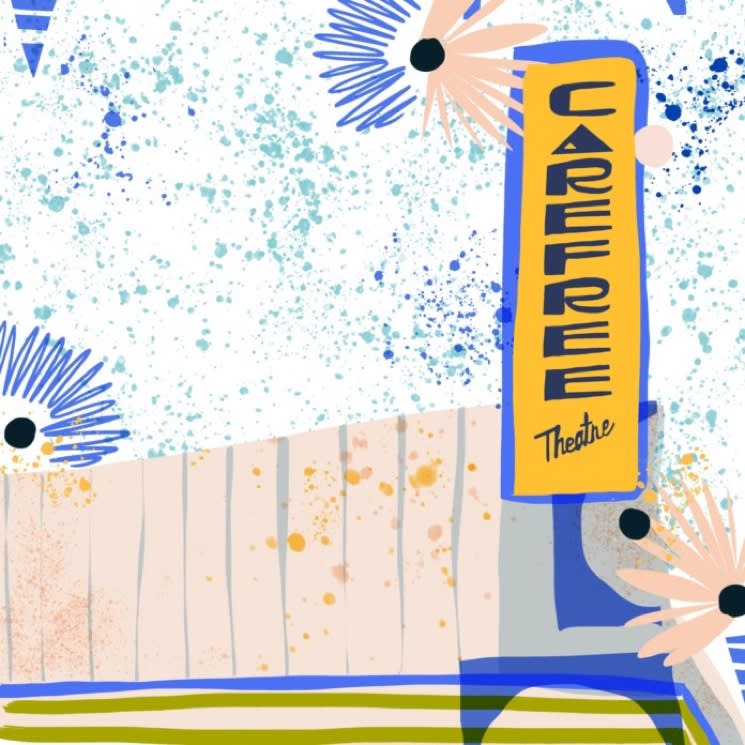With the ten-year anniversary of Surfer Blood's debut, Astro Coast, having just passed, and with principal songwriter John Paul Pitts having moved back to his Florida hometown after a decade of touring with the band, there's a full-circle sense of homecoming and back-to-basics that's apparent on their latest, Carefree Theatre. These are quick and concise, no-frills indie-rock songs flecked with just enough post-surf foam to suggest a deeper connection with the currents of tradition, and free of some of the more experimental structures the band has flirted with in the past — although there's still always room for a playful lead section here and there.
Some elements from their past that haven't made the cut, and that continue to be missed here, are the noisier aspects of their debut ("Swim" stands above almost everything they've done since in terms of emotion and urgency, for instance). But if you're a fan of the less-intense, more easy-going vibe the band has gone on to cultivate over its career, Carefree Theatre will deliver the goods.
Originally slated for a spring 2020 release, the album was pushed back to the fall, adding an amusingly unforeseen layer of secondary meaning to early highlight "Karen," a quick character sketch of a newly-inspired musician whose talents are perhaps dubious. As usual, there's a wry detachment to Pitts's stories and observations that keep things light, for the most part, but there are more thoughtful moods as well. The title track laments the demolition of the theatre that formed the centre of Pitts's cultural world growing up, its loss symbolic of disheartening shifts in cultural/governmental priorities. There is a subtle melancholy that hangs over the album in this regard — the realization that things don't stay the same, even in familiar places.
The album gets more interesting is it goes on, with some of the more arresting details occurring in its final moments — the cool synth interlude on "Dewar," for instance (at five and a half minutes, it's the one track where the band allows itself to stretch out a bit, to good result), and the striking plucked-string melody of closer "Rose Bowl," which is a dead-ringer for Sting's "Fields of Gold" in a totally good way.
While these and plenty of other prior moments certainly make Carefree Theatre worthwhile, some of album's more pedestrian elements slide by — bouncy, sing-song verses that Pitts can obviously write in his sleep and which come off as a bit insubstantial sometimes, the whole thing threatening to blow away with the faintest breeze. Carefree Theatre is certainly pleasant enough to get swept up in however, and a good capstone to a decade's work.
(Kanine)Some elements from their past that haven't made the cut, and that continue to be missed here, are the noisier aspects of their debut ("Swim" stands above almost everything they've done since in terms of emotion and urgency, for instance). But if you're a fan of the less-intense, more easy-going vibe the band has gone on to cultivate over its career, Carefree Theatre will deliver the goods.
Originally slated for a spring 2020 release, the album was pushed back to the fall, adding an amusingly unforeseen layer of secondary meaning to early highlight "Karen," a quick character sketch of a newly-inspired musician whose talents are perhaps dubious. As usual, there's a wry detachment to Pitts's stories and observations that keep things light, for the most part, but there are more thoughtful moods as well. The title track laments the demolition of the theatre that formed the centre of Pitts's cultural world growing up, its loss symbolic of disheartening shifts in cultural/governmental priorities. There is a subtle melancholy that hangs over the album in this regard — the realization that things don't stay the same, even in familiar places.
The album gets more interesting is it goes on, with some of the more arresting details occurring in its final moments — the cool synth interlude on "Dewar," for instance (at five and a half minutes, it's the one track where the band allows itself to stretch out a bit, to good result), and the striking plucked-string melody of closer "Rose Bowl," which is a dead-ringer for Sting's "Fields of Gold" in a totally good way.
While these and plenty of other prior moments certainly make Carefree Theatre worthwhile, some of album's more pedestrian elements slide by — bouncy, sing-song verses that Pitts can obviously write in his sleep and which come off as a bit insubstantial sometimes, the whole thing threatening to blow away with the faintest breeze. Carefree Theatre is certainly pleasant enough to get swept up in however, and a good capstone to a decade's work.




